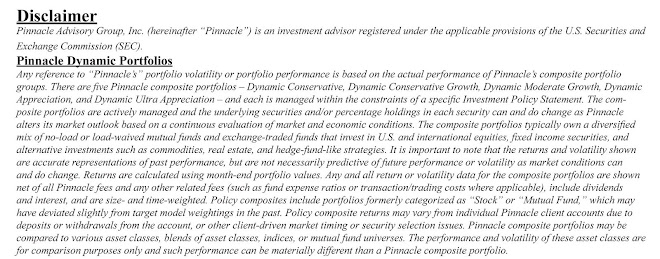For many years I have punctuated many discussions about protecting against a market “melt up” by saying, “What would happen if we came in tomorrow and they captured Bin Laden?” Well, last night we found out that Bid Laden is dead. It is something of a surprise to me that as of 3:45 PM this afternoon the S&P 500 Index is actually down 4 points to a price of 1,361. This is just another example of why I find it impossible to explain market behavior on a day to day basis. Maybe the lack of investor enthusiasm has to do with today’s ISM (Institute of Supply Management) report which came in at 60 (above expectations) but with the prices paid component also above expectations. Prices paid is an indicator of inflation in the pipeline so maybe investors remain spooked about what happens when the Fed stops the QE2 program. I don’t know. I would have thought that getting Bin Laden would have people feeling good about the country and that would have led to a positive “Black Swan” surprise moment for stocks that would take the market up to sharply higher prices on the day. Wrong.
Of course this isn’t the first time I’ve been wrong about how events have played out in the market recently. I freely admit to thinking that the Japanese nuclear disaster would lead to significantly lower stock prices as investors worried about the impact of slower Japanese GDP growth as radioactive water was leaking into the ocean. I could visualize mass selling while radioactive clouds drifted over Tokyo. It turns out that investors were unimpressed by that particular event as well. Stock prices have pretty much headed higher since the tsunami/earthquake/nuclear event on March 12th. In the U.S., stocks fell 3% in two days following the disaster but from March 16th to April 29th they have gained 8.74%. Apparently bad news won’t shake the bullishness from the market, but good news doesn’t seem to be able to move the market to extremes, either.
At a March 12th meeting of Pinnacle’s investment analysts, it was explained to me that Japan was such a small part of the geopolitical puzzle that the unlikely event of a full nuclear meltdown would have little impact on global financial markets. Today we must conclude that Bin Laden’s death is also being discounted as being irrelevant to the health of the global economy. Either he is presumed to not be a relevant force within al Qaeda, or al Qaeda is presumed not to be a relevant force, or….well…I don’t know. At any rate, now I’m going to have to think of a different positive Black Swan event to use as my example for what happens when unexpectedly good news hits the markets.
skip to main |
skip to sidebar
Subscribe via email
Who is Echoing from the Pit
This blog represents the individual opinions of the Investment Team at Pinnacle Advisory Group in Columbia, Maryland
The Investment Team comprises:
Ken Solow, CFP, CLU, ChFC
Rick Vollaro, CPA
Carl Noble, CFA
Sean Dillon
Sauro Locatelli
To learn more about Pinnacle please visit our website at http://www.pinnacleadvisory.com/
The Investment Team comprises:
Ken Solow, CFP, CLU, ChFC
Rick Vollaro, CPA
Carl Noble, CFA
Sean Dillon
Sauro Locatelli
To learn more about Pinnacle please visit our website at http://www.pinnacleadvisory.com/
About Me
- Echoes from the Pit
- Columbia, Maryland, United States
Pinnacle in the News
Blog Archive
-
▼
2011
(169)
-
▼
May
(13)
- On the Road Again
- Update on Sector Performance
- Watching for Signs of European Banking Risk
- Divergences Among LEIs
- Data Confirms Soft Patch, Market Shrugs
- Another Little Sign
- Sequencing
- The Strange Case of Two Unloved Secular Stories
- Soft Patch Upon Us
- Employment Gains Continue
- Out With Commodities?
- Interest Rates & Group Think
- The Osama Bin Laden Bull Market
-
▼
May
(13)

